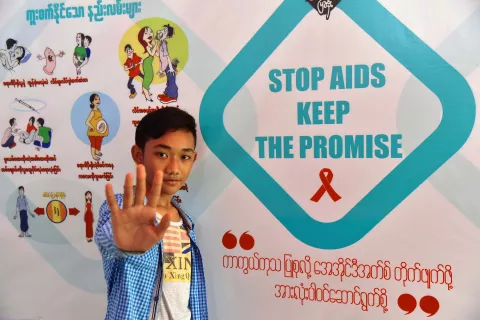"It's about survival. It's about respect."
preventing HIV in China
- Available in:
- 中文
- English
In the centre of Guangzhou, a sprawling industrial city of 12 million in Southern China, dedicated staff in a small clinic are working to protect some of the most vulnerable from HIV.
Xiao Tian*, 19, started working here after using the services himself, but already knows this is the place for him. “It can be very difficult to work here sometimes,” he says. “I've seen 12 positive tests in the last two months. It's hard, but I do this because I really want to help people. I think this is my place.”
Xiao Tian is being trained at the Lingnan Partner(岭南伙伴)clinic to become a counsellor. “Before their test, I give people information on how to avoid high-risk behaviours and how to protect themselves,” he says, sitting on a sofa in one of the clinic's offices. “If the test is positive, we'll provide a counsellor to support them and refer them to a hospital. We'll always offer support.”
Guangzhou is one of the hardest hit cities by HIV in China, and adolescents are particularly at risk. Infection rates among students have reportedly nearly doubled since 2002. In a city with a population the size of Portugal, where is there still high level of stigma and fear around HIV, it's a big challenge for government health workers to reach those most at risk.
As part of the national HIV prevention and control strategy, the Government of China is empowering community-based organisations to help those in need and prevent HIV.
That's why UNICEF is now working with community organisations like Lingnan Parner to encourage young people to access government-provided testing and treatment services, in a non-intimidating and adolescent friendly way.
As an adolescent himself, Xiao Tian knows the risks only too well. “So many teenagers don't know about safe sex when they first have sex - we make sure we teach them. We empower adolescent groups to talk and ask questions, to learn about safe sex. We provide a safe space so they are never afraid to talk or ask for help.”
Xiao Tian then turns to his smart phone, scrolling through some applications. “Phone apps and social networks are being used by many men to find hook-ups, which can be risky,” he says. “We are engaging with these networks to spread information about HIV and our services.”
As well as engaging with existing networks, Lingnan has its own mobile application. Xiao Tian opens the application and shows how people can get information on HIV and safe sex, access forums, book appointments for testing and counselling, and even order home testing kits for a small fee.
Peer to peer student counselling
Lingnan Partner is also reaching out to adolescent groups by training university students to become peer-to-peer educators. With strong support from the local health and education bureaus, Lingnan is able to work with student groups to engage a large of number of young people learn about safe sex, and refer teenagers to health services when needed.
One such group is the Guangdong Youth Network (WeChat: GDYNforyou).
21-year-old social work student Yao Zhi Lu has hit many barriers but her enthusiasm to promote sex education has remained undimmed. “Many students aren't willing to discuss sex at first. If I want to talk to people about it they all run… even my roommate didn't want to admit she knows me,” she says, smiling.
Yao Zhi Lu believes the younger generation has a big responsibility to increase understanding and make changes. “I can't tell my parents I do this, they wouldn't like it. The older generation doesn't really understand we're actually teaching people about protection.”
Lectures, videos, events, even ‘hugathons', are all ways they are reaching out to young people with potentially life-saving information. Other students, such as Li Hao and Zhang Zhaolin, are constantly on the look out to find innovative ways to share safe sex messages.
“Sex education is not just about having sex,” says Xu Li Hui, another student and peer-to-peer educator. “It's about survival. It's about respect. We're reaching 1000s of students with this message.”
But there is still much work to be done. “In a middle school I asked 155 children to stand up if they had heard of HIV,” says medical student Tao Ming Li. “They all stood up. Then I asked them if they knew how they could prevent it – they all sat down.”
But young people like Tao Ming Li are making a difference. “After 3 years, we were able to reach around 15,000 students. In the end, we got our school to integrate sex education in the curriculum.”
As the work of staff and volunteers at Lingnan Partner shows, testing is only part of the effort to help prevent HIV. People, particularly vulnerable groups such as adolescents, need a safe space to get together and share information.
Safe spaces is an area where young people are given a private space to talk to a trusted person about their personal issues. This could be a room, or even an online chat room – it just needs to be somewhere young people can talk privately without feeling shy or without feeling shame, and to get trusted advice on what can be done.
“We help people not only to solve their own issues but help build their capacity to help others,” says Li Xiaomi, as she looks through her packed calendar for the day. “The information, the understanding… that's where change can happen.”
* Not their real name



